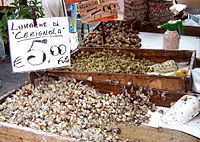Helicidae: Difference between revisions
→Subfamilies and genera within the family Helicidae: - authorities |
-div |
||
| Line 34: | Line 34: | ||
==Shell description== |
==Shell description== |
||
The |
The [[gastropod shell|shell]]s of these snails are mostly rather globular in shape. In some genera, such as ''[[Cepaea]]'', the shells are brightly colored and patterned. |
||
==Subfamilies and genera within the family Helicidae== |
==Subfamilies and genera within the family Helicidae== |
||
| Line 41: | Line 41: | ||
After Fauna Europaea<ref>[http://www.faunaeur.org/full_results.php?id=11479 Fauna Europaea]</ref> and Taxonomy Browser<ref>[http://www.ncbi.nlm.nih.gov/Taxonomy/Browser/wwwtax.cgi?mode=Undef&id=6533&lvl=3&p=has_linkout&keep=1&srchmode=1&unlock Taxonomy Browser]</ref> the family Helicidae includes the following [[subfamily|subfamilie]]s, [[tribe (biology)|tribu]]s and [[genus (biology)|genera]]: |
After Fauna Europaea<ref>[http://www.faunaeur.org/full_results.php?id=11479 Fauna Europaea]</ref> and Taxonomy Browser<ref>[http://www.ncbi.nlm.nih.gov/Taxonomy/Browser/wwwtax.cgi?mode=Undef&id=6533&lvl=3&p=has_linkout&keep=1&srchmode=1&unlock Taxonomy Browser]</ref> the family Helicidae includes the following [[subfamily|subfamilie]]s, [[tribe (biology)|tribu]]s and [[genus (biology)|genera]]: |
||
<div style="height:400px; overflow:auto; border:thin green solid; padding:4px;"> |
|||
'''Subfamily [[Ariantinae]]''' Mörch, 1864 |
'''Subfamily [[Ariantinae]]''' Mörch, 1864 |
||
:''[[Arianta]]'' Turton, 1831 |
:''[[Arianta]]'' Turton, 1831 |
||
| Line 78: | Line 77: | ||
:''[[Tacheocampylaea]]'' |
:''[[Tacheocampylaea]]'' |
||
:''[[Tyrrheniberus]]'' |
:''[[Tyrrheniberus]]'' |
||
</div> |
|||
==References== |
==References== |
||
Revision as of 19:53, 5 October 2008
| Helicidae | |
|---|---|

| |
| Scientific classification | |
| Kingdom: | |
| Phylum: | |
| Class: | |
| Subclass: | |
| Superorder: | |
| Order: | |
| Superfamily: | |
| Family: | Helicidae |
| Subfamilies | |
The Helicidae, sometimes known as the typical snails, are a taxonomic family of small to large, air-breathing, land snails. In other words, they are terrestrial pulmonate gastropod mollusks.
Several species in this family are edible, including Helix aspersa the garden snail, and Helix pomatia the "escargot".
Some genera within this family create and use love darts as part of their mating behavior.

Distribution
The family is native to Europe.
However some of the species, such as for example Helix aspersa, have been introduced and become established in numerous different places worldwide.
Many accidental introductions happen because the eggs of most Helicidae are laid in the soil, and they may thus easily travel unnoticed along with landscaping plants.
Shell description
The shells of these snails are mostly rather globular in shape. In some genera, such as Cepaea, the shells are brightly colored and patterned.
Subfamilies and genera within the family Helicidae


After Fauna Europaea[1] and Taxonomy Browser[2] the family Helicidae includes the following subfamilies, tribus and genera:
Subfamily Ariantinae Mörch, 1864
- Arianta Turton, 1831
- Causa
- Chilostoma Fitzinger, 1833
- Cylindrus Fitzinger, 1833
- Drobacia
- Faustina
- Helicigona A. Férussac, 1821
- Isognomostoma Fitzinger, 1833
- Vidovicia
Subfamily Helicinae Rafinesque, 1815
- Tribe Thebini small> Wenz, 1923 (the synonym Euparyphinae Perrot, 1939 has been declared an invalid name)
- Theba Risso, 1826 - Theba pisana (O. F. Müller, 1774)
- Tribe Helicini Rafinesque, 1815
- Allognathus
- Assyriella
- Cantareus Risso, 1826
- Cepaea Held, 1838
- Codringtonia
- Cornu Born, 1778
- Eobania P. Hesse, 1913
- Helix Linnaeus, 1758
- Hemicycla
- Iberus
- Idiomela T. Cockerell, 1921
- Lampadia
- Leptaxis
- Levantina
- Otala Schumacher, 1817
- Pseudotachea
- Tyrrhenaria
- Tribe Murellini Hesse, 1918
- Macularia
- Marmorana W. Hartmann, 1844
- Tacheocampylaea
- Tyrrheniberus
References
- M.P. Kerney & R.A.D. Cameron, 1979, a field guide to the land snails of Britain and northwestern Europe, Collins, London
